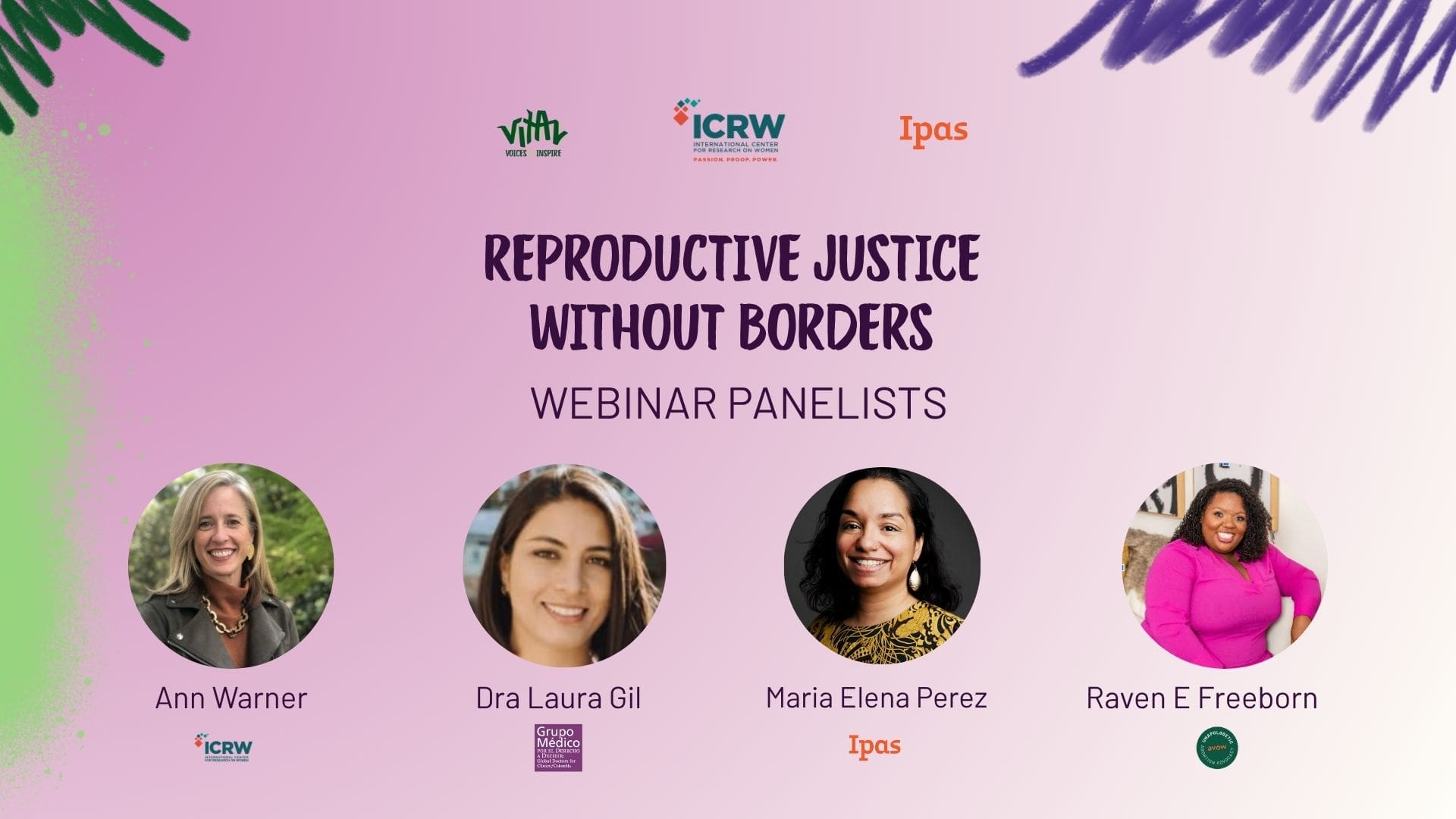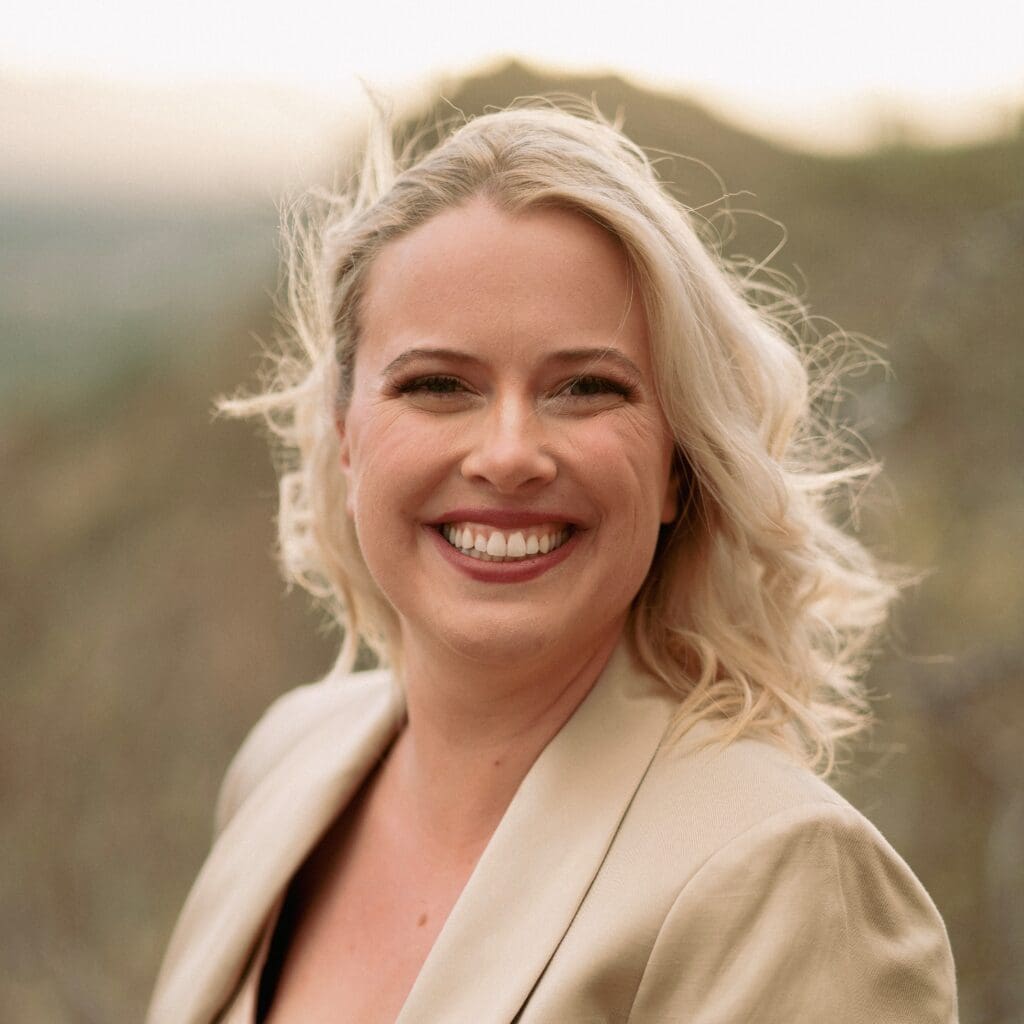
VITAL Blog
Media Contact

On June 26, ICRW and partners hosted Reproductive Justice Without Borders: Many Voices, One Movement—a virtual conversation closing out the VITAL project’s public engagement phase. The event brought together movement leaders from across Latin America and the United States to reflect on strategies, struggles, and solidarity in pursuit of reproductive justice.
The audience, featuring attendees from Africa, Asia, Europe, Latin America, and North America, was moderated by Lindsay Nelson (Repro Empowerment). Attendees heard from Ann Warner (ICRW), María Elena Pérez (Ipas), Dr. Laura Gil (Grupo Médico por el Derecho a Decidir), and Raven Freeborn (Avow Texas).
Here are the key takeaways:
1: Progress is made when movements reflect all our identities
Reproductive justice doesn’t stand alone—it’s shaped by many intersecting forces: racism, colonialism, xenophobia, transphobia, and economic injustice. In both the U.S. South and Latin America, abortion bans are not isolated policy changes—they’re part of broader efforts to control bodies and restrict freedom.
“Reproductive justice issues are indivisible from other social justice issues. It’s because the power systems and structures that intertwine and oppress our communities are the same.” —María Elena Pérez
“We actually want the idea and the theory of reproductive justice to be the vehicle that drives transformative decision making — particularly (in Texas) at the intersection of issues around bodily autonomy, gender-affirming care, and migrancy.”
—Raven Freeborn
Speakers challenged us to reject siloed thinking and instead build movements that reflect the full range of lived experiences—especially of those most impacted.
Reflect: Where are the intersections showing up in your community—and how are they shaping whose voices and needs are centered in the work?
_____________________________________________________________________
2: Reproductive justice requires more than policy change
In Colombia, Causa Justa secured a major legal victory when abortion was legalized in 2022, but the work neither started nor stopped there. Stigma, misinformation, and institutional resistance continue to require effort and strategic thinking. Similarly, in the U.S., legality alone doesn’t guarantee availability of safe abortion—especially for people who are poor, undocumented, uninsured, or criminalized.
“We know that legality is necessary, but it isn’t sufficient to ensure (abortion) access.”
—María Elena Pérez
“Fundamental rights are not negotiable. They do not depend on the opinion of others. ”
—Dr. Laura Gil
Justice requires more than policy change. It means removing the obstacles that persist long after the law changes.
Reflect: What are the gaps between rights on paper and real access where you live or work?
_____________________________________________________________________
3: Coalition work is essential—but it’s not easy
Panelists spoke candidly about the tensions that come with bringing people across identities, generations, and political strategies together. From the Causa Justa campaign in Colombia to U.S. regional networks, building alignment means intentionally creating space for difference, not trying to smooth it over.
“We changed the conversation before we changed the law.”
—Dr. Laura Gil
“This is just the beginning of deepening partnerships across borders and across movements.”
—Lindsay Nelson
Some of the strategies mentioned include:
- Start with shared values, even when tactics differ
- Center listening before decision-making
- Name tensions early, rather than letting them fester
- Build culture change before policy change
The Causa Justa campaign succeeded in part because it incorporated many roles—legal, medical, activist, grassroots—and created a space where each could contribute without dominating. That’s what real coalition looks like: not total agreement, but principled unity and mutual respect.
Reflect: Where is there potential for coalition in your work—and what would it take to build shared clarity while holding space for complexity?
_____________________________________________________________________
4: Invest in collaboration and knowledge-sharing
Even in moments of deep uncertainty and funding cuts, what we have—and what sustains us—is each other. The knowledge, creativity, and care that communities carry is often far more adaptive, timely, and visionary than what institutions can offer.
“We’re seeing a movement from self-care to collective care… caring for each other becomes even more important.”
—María Elena Pérez
“Relationship is a very strong currency—and movements with relational wealth can actually contend for power.”
—Raven Freeborn
Whether through accompaniment networks, WhatsApp groups, or whisper networks of support, this shared wisdom is what keeps people safe, informed, and connected. VITAL was one small effort to create space for that knowledge to surface across borders—and participants made it clear: we need more.
As the panelists reminded us, this kind of critical collaboration often happens without formal funding—sustained by care, conviction, and community. Movements need—and deserve—time, space, and yes—resources—to reflect, share, and grow together.
Reflect: What knowledge already exists in your network? How can you make more space for exchange, care, and connection in the work ahead?
_____________________________________________________________________
The Road Ahead
The formal research findings from VITAL will be submitted to peer-review journals – please subscribe to our newsletter and follow us on Instagram and LinkedIn to keep updated on that. But the lessons and insights exchanged in this conversation are already shaping the future. We’re grateful to the panelists and to every organizer, provider, researcher, and movement builder who joined us.
As you read this, we hope you’ll do more than take note. We hope you’ll ask:
🔹 What does this mean for my community?
🔹 What conversations can we start—or revisit?
🔹 Who can we learn from next?
Together, we’re building a future where reproductive justice knows no borders, through many voices but one movement.
Thank you to ICRW’s VITAL research team: Gabriela Alvarado, Jess Ogden, Erin Leasure, Elena Rodriguez Sanchez and Paige Logan, to the speakers: Ann Warner, Raven Freeborn, Laura Gil, and Maria Elena Perez, and to Lindsay Nelson for the planning of and moderation of the webinar.
VITAL and this webinar are funded through the generosity of the Chanel Foundation.

